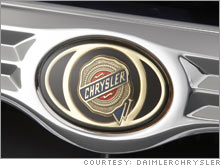Chrysler is American againDaimlerChrysler provides $1.5 billion of financing to seal deal to sell Chrysler to Cerberus Capital, closing books on failed 9-year-old merger.NEW YORK (CNNMoney.com) -- Chrysler Group returned to U.S. ownership Friday, just as the troubled automaker and its U.S. rivals are facing make-or-break labor negotiations and American car buyers are increasingly turning away from domestic makers. The purchase by private equity firm Cerberus Capital Management closes the books on a failed nine-year-old merger. The German automaker then known as Daimler-Benz paid $37 billion for the company in 1998, and essentially ended up paying Cerberus tobuy 80 percent of the automaker, and take its long-term liability to pay for its retirees' healthcare coverage off its hands and off its balance sheet. And because of the recent turmoil in corporate debt markets, at the last minute DaimlerChrysler had to essentially provide $1.5 billion of financing itself to get the deal to close. The companies announced, while the terms of the sale were essentially the same as those announced on May 14 when the deal was unveiled, that DaimlerChrysler (Charts) and Cerberus will sign up for a $2 billion, seven-year second lien loan on Chrysler's automotive business. DaimlerChrysler's portion will be $1.5 billion. One year after the closing, DaimlerChrysler has the right to sell this loan in the credit market. Because of the recent turmoil in the corporate debt market, the closing of the Chrysler deal was being closely watched to see what it would say about the state of those markets, and the announcement Friday was another sign of weakness in both that market and the U.S. auto industry. Daimler tried to put the best spin possible on its role in the financing. "DaimlerChrysler's financing support is a strong sign of its overall determination to make sure that, under the majority [ownership] of Cerberus, Chrysler has a good start as a successful stand-alone car company," said the company's statement. Chrysler Group lost $1.5 billion last year, and it is moving to close factories and cut 13,000 jobs in an effort to stem those losses. But it is the looming cost of covering promises made to retirees and their dependants to provide them with healthcare that is the major cloud hanging over the company. Chrysler has 111,492 retirees and family members receiving benefits, compared to only 41,249 active UAW-represented workers. The current liability of those promised benefits are estimated to be about $18 billion. Last month the three U.S. automakers - General Motors (Charts, Fortune 500), Ford Motor (Charts, Fortune 500) and Chrysler Group - began talks with the United Auto Workers union on a new contract to replace the pact that expires September 14, and healthcare costs, especially for retirees, is expected to be a key to whether the U.S. automakers can have a cost structure competitive with their nonunion rivals. Chrysler is working under the most costly labor pact of the three currently, as the union was unwilling to grant it changes to retiree healthcare coverage that it gave to GM and Ford during the last couple of years, due to the profits at parent DaimlerChrysler. Under the deal, DaimlerChrysler will continue to own just more than 19 percent of Chrysler. But it is in the process of shedding the Chrysler portion of its name, as well as the unit itself. Its shareholders are due to vote on a name change to Daimler in October. Chrysler Group, which includes the Dodge and Jeep brands, has always been the smallest of the traditional Big Three that used to dominate U.S. auto sales between them. But it lost its long-time No. 3 position last year when it fell behind Toyota Motor (Charts) in U.S. sales. In July, Chrysler Group fell behind Honda Motor (Charts) to slip to No. 5 position. July was also the first month that import auto brands outsold domestic brands in term of U.S. sales. |
Sponsors
|

